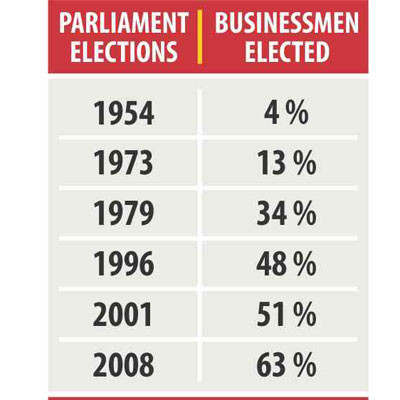President Abdul Hamid and Chief Justice SK Sinha, in their recent comments, have really spoken for the people while talking about the abnormal rise of businessmen in politics.
Speaking at a programme in his home district in Kishoreganj on Monday, the president said the country’s politics has “gone in the pockets of businessmen.” Undoubtedly, it is, as he said, a matter of regret.
The CJ, while speaking at a program in Chittagong University on October 3, also lamented the abnormal concentration of businessmen in our legislative politics.
Most of the lawmakers in developed countries, he said, are students of law. About 90 percent of the congressmen in the US are students of law whereas, as the CJ continued, 80 percent of the lawmakers in Bangladesh are businessmen.
Nobody, except the beneficiaries of the current politics, will disagree with the president who also pronounced that we have to get rid of this politics.
Excessive dependency on businessmen by our major political parties has effectively turned politics into a business in many ways. It is as if an alliance has been created between some politicians and businessmen.
For this situation, businessmen are not responsible alone. The politicians must share the responsibility. They have provided the businessmen the space in politics.
It is known that businessmen donate funds to the major political parties. Many businessmen have opted to join politics formally and become MPs. Some of them have also become ministers. This practice has been going on for long and it has become a worrisome factor in our politics.
Let us look at how the country’s politics, as the president said, has gone to the pocket of businessmen.
The facts available in different studies and books show the periods of undemocratic rules, particularly the two martial law regimes in independent Bangladesh, had been the most productive periods of blessings for businessmen to emerge as politicians.
Of the MPs elected in the 1954 election, only four percent were businessmen and industrialists in profession.
In the 1973 election, the first parliamentary election of independent Bangladesh, of the total MPs, 13 percent were businessmen and industrialists. The rise was nine percentage points in around 20 years.
Law, business and farming were the three most common occupations of the lawmakers elected in the country’s first parliament.
The segment of businessmen and industrialists in parliamentary politics increased to 34 percent from 13 percent in the second parliamentary election held during the martial law regime-led by Gen Zia in 1979, only six years after the first election.
This trend continued during the second martial law regime–led by Gen Ershad. Businessmen continued to enjoy privileges in the two parliamentary elections held during the Ershad regime.
It was because the military rulers were desperate to form political parties to legitimise their illegal power grabs. They were eager to distribute favours to businessmen and others to bring them to their folds.
This form of aberration, the businessmen dominated politics, continued even after the restoration of parliamentary politics and it continued because of the major political parties’ desperate wills to capture state power in any way possible.
In the seventh parliament formed in June 1996, 48 percent of the MPs were businessmen and industrialists in profession.
The percentage of businessmen and industrialists turned MPs went up to 52.10 in the eighth parliament formed after the 2001 election.
In the ninth parliament constituted in January 2009, a whopping 63 percent of the MPs are businessmen.
[There is no exact data available about the number of MPs who are businessmen in the present parliament which was constituted following the one-sided polls in January 2004 with 153 MPs elected uncontested.]
The rise of businessmen and industrialists in politics and the parliament has become one of the major reasons that parliamentary democracy could not reach its full potential. Parliamentary works including making laws and overseeing government activities suffered. It is really a peculiar situation. Our political leaders speak of strengthening democracy, but they have kept the parliament, the temple of democracy, hobbled.
The present situation– political uncertainty, politics of confrontation, lack of rule of law and good governance–is a manifestation of our failure to make the parliament reach its full potential.
There is still hope. Everything is not lost. Yet. The president has forcefully said:” We have to get rid of it.”
The crucial question is: how? The answer is simple: we need to get united and our political parties should sincerely take the lead to save our politics for the sake of the people and their own interests.
President Abdul Hamid, who is a respected and seasoned politician, can play a vital role to save the country’s politics. He can make a move without delay to lead our battling politicians towards a consensus to save politics.

